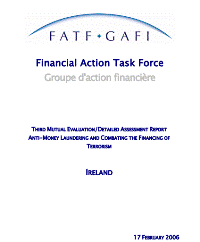This report provides a summary of the AML/CFT measures in place in Ireland at July 2005 (the date of the on-site visit). The report describes and analyses those measures and provides recommendations on how certain aspects of the system could be strengthened. It also sets out Ireland’s levels of compliance with the FATF 40 + 9 Recommendations (see attached table on the Ratings of Compliance with the FATF Recommendations). The Irish Government recognises the need for an effective AML/CFT regime and is in the process of updating its ML/TF framework.
Narcotics offences provide a substantial source of the proceeds of crime in Ireland; considerable illegal proceeds are also derived from fraud-related offences, tax evasion, the evading of excise duties (taking advantage of price differentials from higher rates of excise duty in Northern Ireland) and criminal activity associated with terrorism.
Criminals, including terrorists, have used a variety of techniques to launder money. Irish
authorities have noted that increasingly money launderers have used financial institutions, businesses or professions that are either not regulated or have a low compliance culture for AML to launder money. Investigations have indicated that credit institutions, money remittance companies, solicitors, accountants and second hand car dealerships have all been used in ML schemes.
Ireland has a modern, international financial services sector and a wide range of financial services and institutions operate from the jurisdiction. Depository corporations (such as banks, building societies and credit unions); financial markets (exchanges); insurance corporations and pension funds (life insurance and general insurance); other financial corporations, including financial intermediaries (such as Agency Fund Managers, investment business firms and stockbrokers); financial auxiliaries (such as insurance brokers); and money remittance dealers and bureaux de change.
A full range of Designated Non-Financial Businesses and Professions (DNFBPs) operate in Ireland: Real estate agents/auctioneers, dealers in precious metals and stones, lawyers (solicitors and barristers), accountants and trust and company service providers. There are also a number of private clubs that provide casino type gaming facilities.
Ireland is a republic, with a parliamentary system of government and a common law legal system with a Constitution. The Department of Justice, Equality and Law Reform is responsible for the development and implementation of the criminal law. The Department of Finance is responsible for policy and legislative implementation in relation to the financial sector.
This mutual evaluation was conducted using the FATF Recommendations as published in October 2004, and the 2004 Methodology for Assessing Compliance with the FATF 40 Recommendations and FATF 9 Special Recommendations.


 Twitter
Twitter
 Facebook
Facebook
 Instagram
Instagram
 Linkedin
Linkedin
